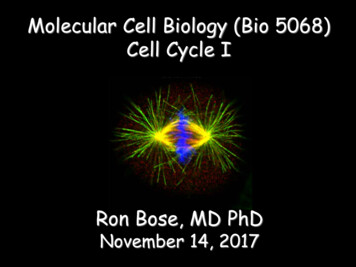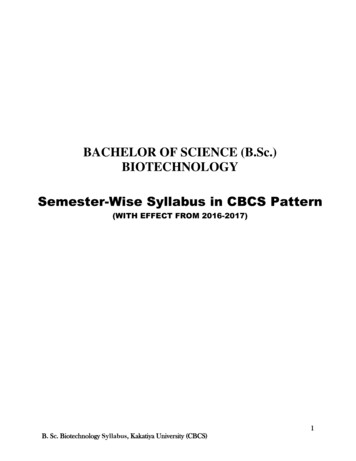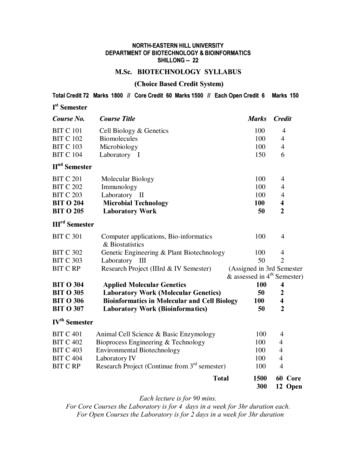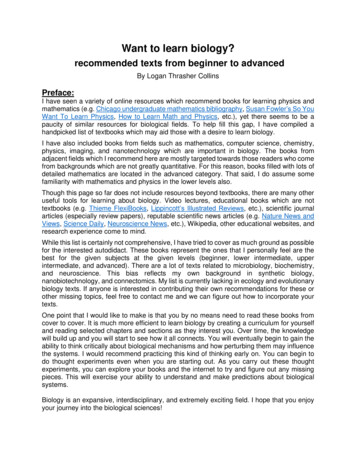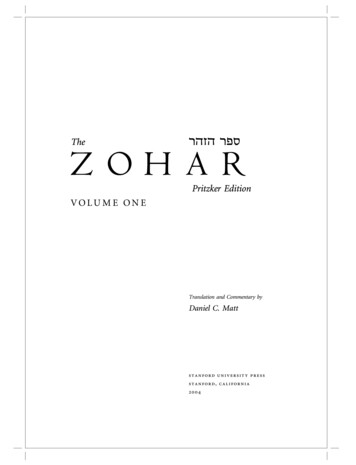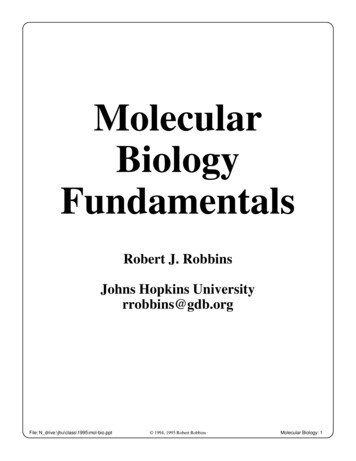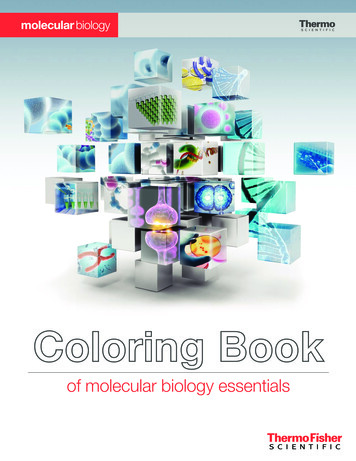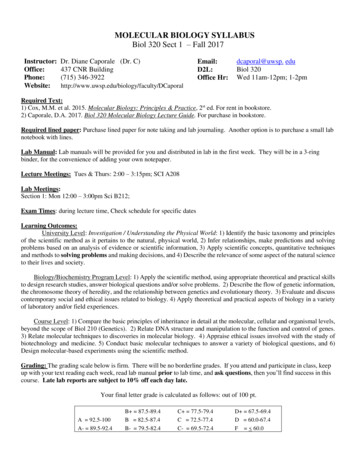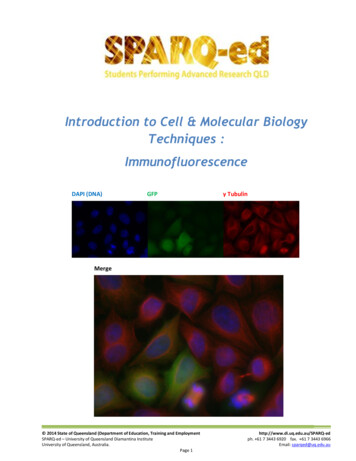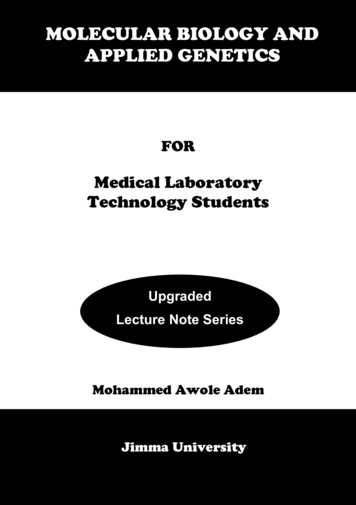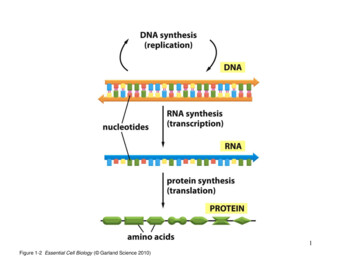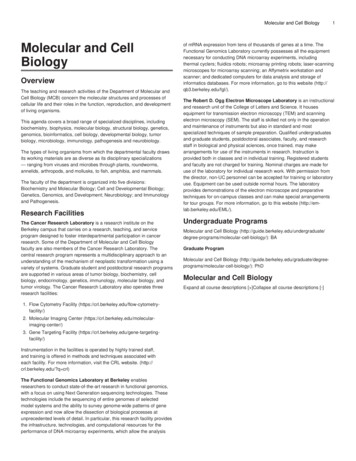
Transcription
Molecular and Cell BiologyMolecular and CellBiologyOverviewThe teaching and research activities of the Department of Molecular andCell Biology (MCB) concern the molecular structures and processes ofcellular life and their roles in the function, reproduction, and developmentof living organisms.This agenda covers a broad range of specialized disciplines, includingbiochemistry, biophysics, molecular biology, structural biology, genetics,genomics, bioinformatics, cell biology, developmental biology, tumorbiology, microbiology, immunology, pathogenesis and neurobiology.The types of living organisms from which the departmental faculty drawsits working materials are as diverse as its disciplinary specializations— ranging from viruses and microbes through plants, roundworms,annelids, arthropods, and mollusks, to fish, amphibia, and mammals.The faculty of the department is organized into five divisions:Biochemistry and Molecular Biology; Cell and Developmental Biology;Genetics, Genomics, and Development; Neurobiology; and Immunologyand Pathogenesis.Research FacilitiesThe Cancer Research Laboratory is a research institute on theBerkeley campus that carries on a research, teaching, and serviceprogram designed to foster interdepartmental participation in cancerresearch. Some of the Department of Molecular and Cell Biologyfaculty are also members of the Cancer Research Laboratory. Thecentral research program represents a multidisciplinary approach to anunderstanding of the mechanism of neoplastic transformation using avariety of systems. Graduate student and postdoctoral research programsare supported in various areas of tumor biology, biochemistry, cellbiology, endocrinology, genetics, immunology, molecular biology, andtumor virology. The Cancer Research Laboratory also operates threeresearch facilities:1. Flow Cytometry Facility 2. Molecular Imaging Center )3. Gene Targeting Facility Instrumentation in the facilities is operated by highly trained staff,and training is offered in methods and techniques associated witheach facility. For more information, visit the CRL website. (http://crl.berkeley.edu/?q crl)The Functional Genomics Laboratory at Berkeley enablesresearchers to conduct state-of-the-art research in functional genomics,with a focus on using Next Generation sequencing technologies. Thesetechnologies include the sequencing of entire genomes of selectedmodel systems and the ability to survey genome-wide patterns of geneexpression and now allow the dissection of biological processes atunprecedented levels of detail. In particular, this research facility providesthe infrastructure, technologies, and computational resources for theperformance of DNA microarray experiments, which allow the analysis1of mRNA expression from tens of thousands of genes at a time. TheFunctional Genomics Laboratory currently possesses all the equipmentnecessary for conducting DNA microarray experiments, includingthermal cyclers; fluidics robots; microarray printing robots; laser-scanningmicroscopes for microarray scanning; an Affymetrix workstation andscanner; and dedicated computers for data analysis and storage ofinformatics databases. For more information, go to this website (http://qb3.berkeley.edu/fgl/).The Robert D. Ogg Electron Microscope Laboratory is an instructionaland research unit of the College of Letters and Science. It housesequipment for transmission electron microscopy (TEM) and scanningelectron microscopy (SEM). The staff is skilled not only in the operationand maintenance of instruments but also in standard and mostspecialized techniques of sample preparation. Qualified undergraduatesand graduate students, postdoctoral associates, faculty, and researchstaff in biological and physical sciences, once trained, may makearrangements for use of the instruments in research. Instruction isprovided both in classes and in individual training. Registered studentsand faculty are not charged for training. Nominal charges are made foruse of the laboratory for individual research work. With permission fromthe director, non-UC personnel can be accepted for training or laboratoryuse. Equipment can be used outside normal hours. The laboratoryprovides demonstrations of the electron microscope and preparativetechniques for on-campus classes and can make special arrangementsfor tour groups. For more information, go to this website (http://emlab.berkeley.edu/EML/).Undergraduate ProgramsMolecular and Cell Biology ograms/molecular-cell-biology/): BAGraduate ProgramMolecular and Cell Biology /molecular-cell-biology/): PhDMolecular and Cell BiologyExpand all course descriptions [ ]Collapse all course descriptions [-]
2Molecular and Cell BiologyMCELLBI 15 Current Topics in the BiologicalSciences 2 UnitsMCELLBI 32 Introduction to HumanPhysiology 3 UnitsTerms offered: Spring 2023, Spring 2022, Spring 2021Students in this course will critically examine modern methods ofbiological investigations and their social implications. Relevant literaturewill be used to present basic biological concepts that address the cultural,technological and health aspects of current topics in the biologicalsciences. Designing and evaluating scientific questions will be stressed.Current Topics in the Biological Sciences: Read More [ ]Rules & RequirementsTerms offered: Fall 2022, Summer 2022 8 Week Session, Fall 2021A comprehensive introduction to human biology. The coursewill concentrate on basic mechanisms underlying human lifeprocesses, including cells and membranes; nerve and muscle function;cardiovascular, respiratory, renal, and gastrointestinal physiology;metabolism, endocrinology, and reproduction.Introduction to Human Physiology: Read More [ ]Rules & RequirementsPrerequisites: Suitable for freshmen who plan to major in a biologicalsciencePrerequisites: One year high school or college chemistryHours & FormatRepeat rules: Course may be repeated for credit when topic changes.Hours & FormatFall and/or spring: 15 weeks - 3 hours of lecture and 1 hour ofdiscussion per weekFall and/or spring: 15 weeks - 2 hours of lecture and 1 hour ofdiscussion per weekSummer: 8 weeks - 6 hours of lecture and 2 hours of discussion perweekAdditional DetailsAdditional DetailsSubject/Course Level: Molecular and Cell Biology/UndergraduateSubject/Course Level: Molecular and Cell Biology/UndergraduateGrading/Final exam status: Letter grade. Final exam not required.Grading/Final exam status: Letter grade. Final exam required.Instructor: MatsuiInstructor: BallCurrent Topics in the Biological Sciences: Read Less [-]Introduction to Human Physiology: Read Less [-]MCELLBI C31 Big Ideas in Cell Biology 3UnitsMCELLBI 32L Introduction to HumanPhysiology Laboratory 2 UnitsTerms offered: Spring 2014, Spring 2012An introduction for students who do not intend to major in biology but whowish to satisfy their breadth requirement in Biological Sciences. Somemajor concepts of modern biology, ranging from the role of DNA and theway cells communicate, to interactions of cells and creatures with theirenvironment, will be discussed without jargon and with attention to theirrelevance in contemporary life and culture.Big Ideas in Cell Biology: Read More [ ]Hours & FormatTerms offered: Fall 2022, Summer 2022 Second 6 Week Session, Fall2021Experiments and demonstrations are designed to amplify and reinforceinformation presented in 32. Exercises include investigations into thestructure and function of muscle, nerve, cardiovascular, renal, respiratory,endocrine, and blood systems.Introduction to Human Physiology Laboratory: Read More [ ]Rules & RequirementsPrerequisites: 32 or may be taken concurrentlyFall and/or spring: 15 weeks - 2 hours of lecture and 1 hour ofdiscussion per weekHours & FormatAdditional DetailsFall and/or spring: 15 weeks - 1 hour of lecture and 3 hours oflaboratory per weekSubject/Course Level: Molecular and Cell Biology/UndergraduateGrading/Final exam status: Letter grade. Final exam required.Summer:6 weeks - 2 hours of lecture and 8 hours of laboratory per week8 weeks - 2 hours of lecture and 6 hours of laboratory per weekInstructor: WiltAdditional DetailsAlso listed as: L & S C30XSubject/Course Level: Molecular and Cell Biology/UndergraduateBig Ideas in Cell Biology: Read Less [-]Grading/Final exam status: Letter grade. Final exam not required.Instructor: BallIntroduction to Human Physiology Laboratory: Read Less [-]
Molecular and Cell BiologyMCELLBI 38 Stem Cell Biology, Ethics andSocietal Impact 3 UnitsTerms offered: Spring 2023, Spring 2022, Spring 2021Innovations in bioengineering and use of stem cells will significantlyimpact our ability to combat human disease, genetic disorders andphysiological dysfunction. An understanding of human stem cell biologywill be critical to make informed decisions on our health and public policy.Stem Cell Biology, Ethics and Societal Impact: Read More [ ]Rules & RequirementsRepeat rules: Course may be repeated for credit with instructor consent.Hours & FormatFall and/or spring: 15 weeks - 3 hours of lecture and 1 hour ofdiscussion per weekAdditional DetailsSubject/Course Level: Molecular and Cell Biology/UndergraduateGrading/Final exam status: Letter grade. Final exam required.Instructors: Firestone, BallStem Cell Biology, Ethics and Societal Impact: Read Less [-]MCELLBI 41 Genetics and Society 3 UnitsTerms offered: Spring 2016, Spring 2013, Summer 2012 8 Week SessionBasic communication of inheritance; gene mapping; gene expression andgenetic disease in animals and humans; social inheritance of genetics.Genetics and Society: Read More [ ]Rules & RequirementsPrerequisites: Primarily for students not specializing in biologyCredit Restrictions: Students will receive no credit for Molecular andCell Biology 41 after completing Biology 1A, Biology 1B, or Letters andScience 18.MCELLBI C44 Biology for Voters 3 UnitsTerms offered: Spring 2017, Spring 2015, Spring 2014This is a Discovery Course for non-Biology majors designed to introducelower-division college students to biology through the lens of thecontemporary problems facing people, the planet and the species of theplanet. Modern genetic contributions will be presented on such issuesas genetic engineering of plants and animals, the emergence of newpathogens, the role of genetic variation among individuals, and theextent to which DNA is and isn’t destiny. Each week will close with thepresentation and discussion of a defining biological challenge facing theworld.Biology for Voters: Read More [ ]Objectives & OutcomesStudent Learning Outcomes: The learning objectives will be, at oneend, to understand what an experiment is, how is it controlled and whatdoes one need to know about an experiment to be able to rely upon anyconclusion. That is the fundamental issue in all science, and is frequentlyoverlooked in many media accounts of science. A second objective isto learn enough of the language of biology to be able to ask the kind ofinformed questions that we would want all elected representatives to payattention to. A third objective is for students to cultivate confidence thatthrough non-specialized information sources they can become informedconsumers of contemporary scientific thought, and to develop thosehabits of intellect to think about evidence in a scientific manner. A fourthobjective is for students to enjoy the abundance of high quality books,articles and multimedia that will enable a lifetime of discovery outside thestructure of a college course.Hours & FormatFall and/or spring: 15 weeks - 3 hours of lecture and 1 hour ofdiscussion per weekAdditional DetailsSubject/Course Level: Molecular and Cell Biology/UndergraduateGrading/Final exam status: Letter grade. Final exam required.Hours & FormatInstructors: Rine, UrnovFall and/or spring: 15 weeks - 2 hours of lecture and 1 hour ofdiscussion per weekSummer:6 weeks - 7.5 hours of lecture per week8 weeks - 6 hours of lecture and 2 hours of discussion per weekAdditional DetailsSubject/Course Level: Molecular and Cell Biology/UndergraduateGrading/Final exam status: Letter grade. Final exam required.Genetics and Society: Read Less [-]3Also listed as: L & S C30YBiology for Voters: Read Less [-]
4Molecular and Cell BiologyMCELLBI 50 The Immune System andDisease 4 UnitsTerms offered: Spring 2023, Spring 2022, Spring 2021Course will discuss how the immune system resolves, prevents, orcauses disease. A general overview of the immune system will becovered in the first five weeks followed by five weeks discussinginfectious diseases including anthrax, mad cow, herpes, malaria,tuberculosis, and HIV. In addition, other lectures will focus oncurrent immunology topics including vaccines, autoimmunity, allergy,transplantation, and cancer.The Immune System and Disease: Read More [ ]Rules & RequirementsPrerequisites: High school chemistry or Chemistry 1A and high schoolbiology or Biology 1A. Biology 1AL is not requiredCredit Restrictions: Students will receive no credit for Molecular andCell Biology 50 after completing Molecular and Cell Biology 102, C100A/Chemistry C130, or Chemistry 135.MCELLBI 55 Plagues and Pandemics 3 UnitsTerms offered: Fall 2022, Summer 2022 Second 6 Week Session, Fall2021Discussion of how infectious agents cause disease and impact societyat large. We will examine historical and current examples of plagues andpandemics and consider the question of what we should do to amelioratethe impact of infectious disease in the future. The course is intended fornon-majors and will begin by briefly providing necessary background inmicrobiology and immunology. The primary focus in each subsequentweek, however, will be on discussing a particular infectious disease. Thecourse will be broad in scope covering biological, historical, ethical andsocial implications of each disease.Plagues and Pandemics: Read More [ ]Rules & RequirementsCredit Restrictions: Students will receive no credit for MCELLBI 55 aftercompleting CHEM C130, MCELLBI 150, MCELLBI C103, MCELLBI 102,or CHEM 135.Hours & FormatHours & FormatFall and/or spring: 15 weeks - 3 hours of lecture per weekFall and/or spring: 15 weeks - 3 hours of lecture and 1 hour ofdiscussion per weekSummer: 6 weeks - 7.5 hours of lecture per weekAdditional DetailsAdditional DetailsSubject/Course Level: Molecular and Cell Biology/UndergraduateSubject/Course Level: Molecular and Cell Biology/UndergraduateGrading/Final exam status: Letter grade. Final exam required.Grading/Final exam status: Letter grade. Final exam required.Instructor: BeattyInstructors: Beatty, VanceThe Immune System and Disease: Read Less [-]Plagues and Pandemics: Read Less [-]
Molecular and Cell Biology5MCELLBI C61 Brain, Mind, and Behavior 3UnitsMCELLBI W61 Brain, Mind, and Behavior 3UnitsTerms offered: Spring 2023, Spring 2022, Spring 2021Introduction to human brain mechanisms of sensation, movement,perception, thinking, learning, memory, and emotion in terms of anatomy,physiology, and chemistry of the nervous system in health and disease.Intended for students in the humanities and social sciences and othersnot majoring in the biological sciences.Brain, Mind, and Behavior: Read More [ ]Rules & RequirementsTerms offered: Summer 2022 First 6 Week Session, Summer 2021 First6 Week Session, Summer 2020 First 6 Week SessionThis course deals with the structure and function of the human nervoussystem, with an emphasis on how brain physiology and chemistryare related to human behavior. This is a comprehensive introductionto the exciting field of contemporary neuroscience for students of allbackgrounds and interests, including those from the humanities andsocial sciences, as well as physical and biological sciences. The FinalExamination will be administered in a proctored setting. See Schedule ofClasses for meeting information. This course is web-based.Brain, Mind, and Behavior: Read More [ ]Rules & RequirementsCredit Restrictions: Students will receive no credit for Molecular andCell Biology/Psychology C61 after taking Molecular and Cell Biology61, N61, W61, Molecular and Cell Biology 104, C100A/Chemistry C130,Molecular and Cell Biology 110, 130A, 136, 160, C160/NeuroscienceC160 or Integrative Biology 132. A deficient grade in Molecular and CellBiology 61, N61, or W61 can be removed with Molecular and Cell BiologyC61. Students cannot credit for both MCELLBI/PSYCH C61 AND Psych110.Hours & FormatCredit Restrictions: Students will receive no credit for MCELLBI/PSYCH W61 after taking MCELLBI 61, N61, C61, MCELLBI 104, C100A/Chemistry C130, MCELLBI 110, 130A, 136, 160, C160/NeuroscienceC160 or Integrative Biology 132. A deficient grade in MCELLBI 61, N61,OR C61 can be removed with W61. Students cannot credit for bothMCELLBI/PSYCH C61 AND Psych 110.Fall and/or spring: 15 weeks - 3 hours of lecture and 1 hour ofdiscussion per weekHours & FormatAdditional DetailsSummer: 6 weeks - 7 hours of web-based lecture and 2.5 hours of webbased discussion per weekSubject/Course Level: Molecular and Cell Biology/UndergraduateOnline: This is an online course.Grading/Final exam status: Letter grade. Final exam required.Additional DetailsInstructor: PrestiSubject/Course Level: Molecular and Cell Biology/UndergraduateAlso listed as: PSYCH C61Grading/Final exam status: Letter grade. Final exam required.Brain, Mind, and Behavior: Read Less [-]Instructor: PrestiBrain, Mind, and Behavior: Read Less [-]
6Molecular and Cell BiologyMCELLBI C62 Drugs and the Brain 3 UnitsTerms offered: Fall 2022, Fall 2020, Fall 2019The history, chemical nature, botanical origins, and effects on thehuman brain and behavior of drugs such as stimulants, depressants,psychedelics, analgesics, antidepressants, antipsychotics, steroids, andother psychoactive substances of both natural and synthetic origin. Thenecessary biological, chemical, and psychological background materialfor understanding the content of this course will be contained within thecourse itself.Drugs and the Brain: Read More [ ]Rules & RequirementsCredit Restrictions: Students will receive no credit for Molecular andCell Biology C62/Letters and Science C30T after completing Molecularand Cell Biology C100A/Chemistry C130, 104, 110, 130, 136, 160Integrative Biology 132.Hours & FormatFall and/or spring: 15 weeks - 3 hours of lecture and 1 hour ofdiscussion per weekSummer: 8 weeks - 4.5 hours of lecture and 2 hours of discussion perweekAdditional DetailsSubject/Course Level: Molecular and Cell Biology/UndergraduateGrading/Final exam status: Letter grade. Final exam not required.Instructor: PrestiAlso listed as: L & S C30TDrugs and the Brain: Read Less [-]MCELLBI 63 Introduction to FunctionalNeuroanatomy 3 UnitsTerms offered: Summer 2022 Second 6 Week Session, Summer 2021Second 6 Week Session, Summer 2020 Second 6 Week SessionThis course emphasizes beginning anatomy of the brain and spinal cordto individuals interested in understanding the dynamics of motor andsensory functions in the human body. Students in the Departments ofEducation, Psychology, and Integrative Biology, as well as studentsinterested in medicine and the life sciences, are especially encouraged toattend.Introduction to Functional Neuroanatomy: Read More [ ]Rules & RequirementsCredit Restrictions: Students will receive no credit for Molecular andCell Biology 63 after completing Molecular and Cell Biology 104, C100A/Chemistry C130, Molecular and Cell Biology 110, 130A, 136, 160, 161,C160/Neuroscience C160 or Integrative Biology 132.Hours & FormatSummer:4 weeks - 12 hours of lecture per week6 weeks - 7.5 hours of lecture per week8 weeks - 6 hours of lecture per weekAdditional DetailsSubject/Course Level: Molecular and Cell Biology/UndergraduateGrading/Final exam status: Letter grade. Final exam required.Introduction to Functional Neuroanatomy: Read Less [-]
Molecular and Cell Biology7MCELLBI 63L Introduction to NeuroanatomyLab 2 UnitsMCELLBI C64 Exploring the Brain:Introduction to Neuroscience 3 UnitsTerms offered: Summer 2019 Second 6 Week SessionThis lab course is an introduction to mammalian neuroanatomy for nonMCB majors. We will do dissections, explore physical anatomical models,and observe microscopic structures within preserved brain slices from avariety of mammalian species. The hands-on exploration of anatomy iskey to understanding how the different functional regions of the nervoussystem are interconnected. Besides gaining a better understanding ofanatomy, you will gain important scientific skills such as conducting partsof a neurological exam, fluorescent and light microscopy, reading MRIscans and conducting fine dissections. The course will culminate witha group project using the online Allen Brain Atlas to investigate a novelscientific question.Introduction to Neuroanatomy Lab: Read More [ ]Rules & RequirementsTerms offered: Summer 2022 8 Week Session, Summer 2021 8 WeekSession, Summer 2020 8 Week SessionThis course will introduce lower division undergraduates to thefundamentals of neuroscience. The first part of the course coversbasic membrane properties, synapses, action potentials, chemical andelectrical synaptic interactions, receptor potentials, and receptor proteins.The second part of the course covers networks in invertebrates, memoryand learning behavior, modulation, vertebrate brain and spinal cord,retina, visual cortex architecture, hierarchy, development, and highercortical centers.Exploring the Brain: Introduction to Neuroscience: Read More [ ]Rules & RequirementsPrerequisites: High school chemistry or Chemistry 1A; high schoolbiology or Biology 1A. Biology 1AL is not requiredPrerequisites: MCELLBI 63 (may be taken concurrently) or equivalentCredit Restrictions: Students will receive no credit for Molecular andCell Biology 63L after taking Molecular and Cell Biology 160L or 163LHours & FormatSummer: 6 weeks - 8 hours of laboratory per weekAdditional DetailsSubject/Course Level: Molecular and Cell Biology/UndergraduateGrading/Final exam status: Letter grade. Alternative to final exam.Instructor: BallCredit Restrictions: Students will receive no credit for Molecular andCell Biology/Psychology C64 after taking Molecular and Cell Biology C61/Letters and Science C30W, Molecular and Cell Biology C104, 100A/Chemistry C130, Molecular and Cell Biology 110, 130A, 136, 160, C160/Neuroscience C160, or Integrative Biology 132. Students may remove adeficient grade in Molecular and Cell Biology C64/Psychology C64 afterMolecular and Cell Biology 64.Hours & FormatFall and/or spring: 15 weeks - 2 hours of lecture and 1 hour ofdiscussion per weekSummer: 8 weeks - 4 hours of lecture and 2 hours of discussion perweekIntroduction to Neuroanatomy Lab: Read Less [-]Additional DetailsSubject/Course Level: Molecular and Cell Biology/UndergraduateGrading/Final exam status: Letter grade. Final exam required.Instructor: CaporaleAlso listed as: PSYCH C64Exploring the Brain: Introduction to Neuroscience: Read Less [-]
8Molecular and Cell BiologyMCELLBI 65 Neuroscience, Film, andPhilosophy 3 UnitsMCELLBI 84B Sophomore Seminar 1 or 2UnitsTerms offered: Spring 2023Advances in neuroscience are forcing us to confront anew questionsconcerning the nature of identity, reality, morality, and free will. Scientistscan now implant artificial memories, augment natural brain capabilities,and read out intentions from the brain before they are acted upon. Thisclass intends to shine a light on the brave new world enabled by modernneuroscience through three lenses: science, film, and philosophy. Topicsto be covered include: the architecture of the brain, AI & the mind bodyproblem, the neural construction of reality, action and free will, memory,the neural basis of morality, mechanisms for brain wiring, mental illness,and brain machine interfaces.Neuroscience, Film, and Philosophy: Read More [ ]Hours & FormatTerms offered: Fall 2013, Spring 2013, Fall 2012Sophomore seminars are small interactive courses offered by facultymembers in departments all across the campus. Sophomore seminarsoffer opportunity for close, regular intellectual contact between facultymembers and students in the crucial second year. The topics vary fromdepartment to department and semester to semester. Enrollment limitedto 15 sophomores.Sophomore Seminar: Read More [ ]Rules & RequirementsFall and/or spring: 15 weeks - 3 hours of lecture per weekAdditional DetailsPrerequisites: At discretion of instructorRepeat rules: Course may be repeated for credit without restriction.Hours & FormatFall and/or spring: 15 weeks - 1-2 hours of seminar per weekGrading/Final exam status: Letter grade. Final exam required.Summer:6 weeks - 4-6 hours of seminar per week8 weeks - 3-4 hours of seminar per weekInstructor: TsaoAdditional DetailsNeuroscience, Film, and Philosophy: Read Less [-]Subject/Course Level: Molecular and Cell Biology/UndergraduateMCELLBI C75 Introduction to theBiotechnology Field and Industry 2 UnitsGrading/Final exam status: The grading option will be decided by theinstructor when the class is offered. Final exam required.Terms offered: Spring 2019This course offers an introduction to the field of biotechnology and willcover the history of the field, its impact on medicine and society, keymethodologies, important therapeutic areas, and the range of careeroptions available in the biopharmaceutical industry. In addition to lectureson innovation and entrepreneurship, students will hear from lecturerswith expertise ranging from molecular biology to clinical trial design andinterpretation. Several case studies of historically impactful scientists,entrepreneurs, and biotherapeutic companies will be presented. Studentswill work in teams to create and develop novel biotechnology companyideas to present in class. Intended for students interested in the Biology Business program.Introduction to the Biotechnology Field and Industry: Read More [ ]Hours & FormatSophomore Seminar: Read Less [-]Subject/Course Level: Molecular and Cell Biology/UndergraduateFall and/or spring: 15 weeks - 2 hours of lecture per weekAdditional DetailsSubject/Course Level: Molecular and Cell Biology/UndergraduateGrading/Final exam status: Offered for pass/not pass grade only.Alternative to final exam.Instructors: Kirn, LaskyFormerly known as: Molecular and Cell Biology C95B/Undergrad.Business Administration C95BAlso listed as: UGBA C95BIntroduction to the Biotechnology Field and Industry: Read Less [-]
Molecular and Cell Biology9MCELLBI 88 Immunotherapy of Cancer:Success and Failures 2 UnitsMCELLBI 90B Freshman Seminars: Cell andDevelopmental Biology 1 UnitTerms offered: Spring 2018, Spring 2017We will work with a variety of datasets that describe a molecular view ofcells and how they divide. We will learn about the processes that causecells to become specialized (differentiate) and to give rise to cancer(transform). We will analyze data on genetic mutations in cancer thatdistinguish tumor cells from normal cells. We will learn how mutations aredetected by the immune system and the basis of cancer immunotherapy.Finally we will analyze data on clinical trials of cancer immunotherapy todefine the correlates of success in curing the disease. The students areexpected to gain an understanding of data that reveals the basics of cellphysiology and cancer, how immunotherapies of cancer work and theircurrent limitations.Immunotherapy of Cancer: Success and Failures: Read More [ ]Rules & RequirementsTerms offered: Spring 2023, Fall 2021, Spring 2018The Berkeley Seminar Program has been designed to provide newstudents with the opportunity to explore an intellectual topic with a facultymember in a small-seminar setting. Berkeley Seminars are offered in allcampus departments, and topics vary from department to departmentand semester to semester. Final assessment to be decided by theinstructor when the class is offered.Freshman Seminars: Cell and Developmental Biology: Read More [ ]Rules & RequirementsPrerequisites: Foundations of Data Science: COMPSCI C8, DATASCIC8, INFO C8 or STAT C8Fall and/or spring: 15 weeks - 1 hour of seminar per weekPrerequisites: Open to freshmen onlyRepeat rules: Course may be repeated for credit without restriction.Hours & FormatAdditional DetailsHours & FormatSubject/Course Level: Molecular and Cell Biology/UndergraduateFall and/or spring: 15 weeks - 1 hour of lecture and 1 hour of laboratoryper weekGrading/Final exam status: The grading option will be decided by theinstructor when the class is offered. Alternative to final exam.Additional DetailsFreshman Seminars: Cell and Developmental Biology: Read Less [-]Subject/Course Level: Molecular and Cell Biology/UndergraduateGrading/Final exam status: Letter grade. Alternative to final exam.Instructor: ShastriImmunotherapy of Cancer: Success and Failures: Read Less [-]MCELLBI 90A Freshman Seminars:Biochemistry and Molecular Biology 1 UnitTerms offered: Fall 2020, Fall 2019, Fall 2018The Berkeley Seminar Program has been designed to provide newstudents with the opportunity to explore an intellectual topic with a facultymember in a small-seminar setting. Berkeley Seminars are offered in allcampus departments, and topics vary from department to departmentand semester to semester. Final assessment to be decided by theinstructor when the class is offered.Freshman Seminars: Biochemistry and Molecular Biology: Read More [ ]Rules & RequirementsMCELLBI 90C Freshman Seminars: Geneticsand Development 1 UnitTerms offered: Spring 2022, Fall 2019, Fall 2018The Berkeley Seminar Program has been designed to provide newstudents with the opportunity to explore an intellectual topic with a facultymember in a small-seminar setting. Berkeley Seminars are offered in allcampus departments, and topics vary from department to departmentand semester to semester. Final assessment to
The teaching and research activities of the Department of Molecular and Cell Biology (MCB) concern the molecular structures and processes of cellular life and their roles in the function, reproduction, and development of living organisms. This agenda covers a broad range of specialized disciplines, including biochemistry, biophysics, molecular .
